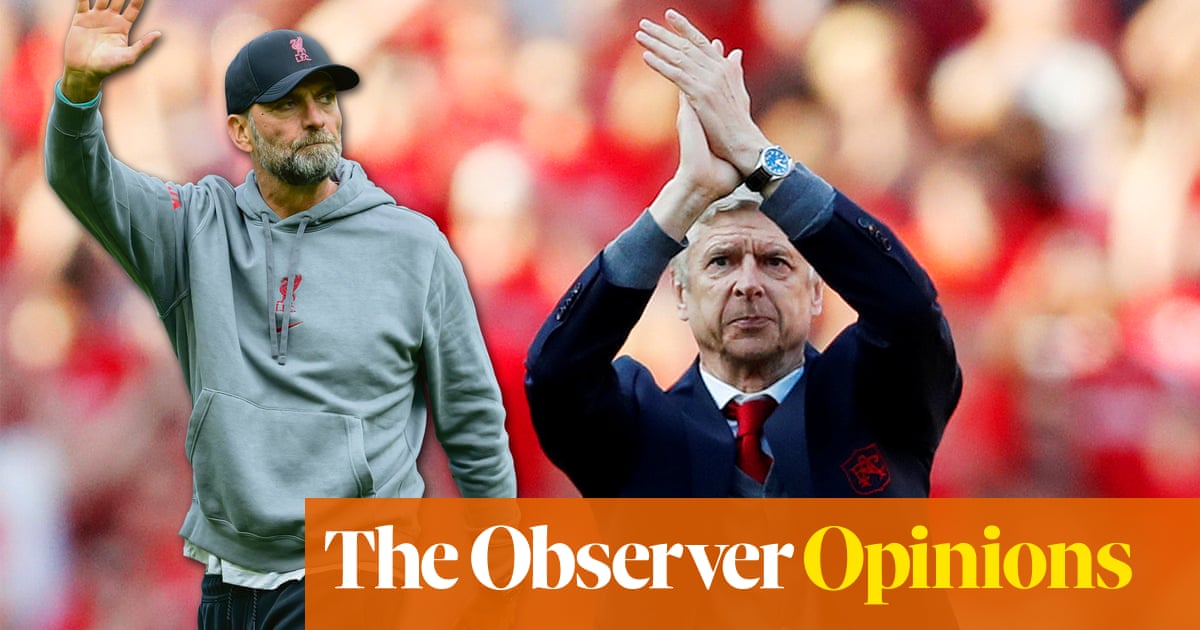
Jürgen Klopp could not be more excited. Jürgen Klopp’s passion for football is as strong as it ever was. Jürgen Klopp wants to work with incredible football talent. Jürgen Klopp is joining Red Bull as their head of global soccer. One of these sentences, clearly, is not like the others.
Which is not to impugn the sincerity of the official statement issued jointly by Klopp and the world’s stickiest energy drink on Wednesday morning, announcing his new role with the corporate giant. On the contrary: this is a job that positively exudes passion, excitement, connection. Klopp tearing through the boardroom after delivering a successful seminar. Getting mobbed by delirious data scientists. Firing up the Microsoft Teams call with his famous fist pumps.
The reality is probably going to be a little more prosaic. A lot of the snap analysis of Klopp’s decision seemed to regard this move as an inevitable pirouette towards a return to management: perhaps at one of the Red Bull clubs, perhaps as the German national team manager, a job that Klopp will reportedly be allowed to take if it ever comes up. But if a return to coaching is the overarching goal here, then this feels like a pretty strange way of going about it.
The national team position is occupied by Julian Nagelsmann, who seems happy enough to continue at least to the 2026 World Cup, if not even further. Equally, for all the struggles of Pepijn Lijnders at RB Salzburg, it’s hard to envisage a scenario in which Klopp willingly replaces his former assistant. Perhaps the Leipzig job comes up at some point. But when you have the pick of the world’s clubs, why restrict yourself?
Instead, this feels like the kind of thing you do when you’re still not sure what you want to do. Grandiose job title aside, the brief itself feels reassuringly vague. “I want to see, feel and figure out what is useful for football,” he said. “Developing football a little bit as well.” As a sacred mission statement, “turning doubters into believers” this is not.
Perhaps the most telling part of Klopp’s own justification for taking the job is when he expresses his desire to “learn again”, to enjoy the luxury of football as a purely intellectual pursuit, without the tyranny of league tables or the obligation of having to explain himself on camera several times a week. This could be the prelude to a rebooted coaching career, Klopp 4.0 with a pocketful of new tricks. Or it could be the start of an extended dotage in the unloved netherworld of football administration, churning out crackpot ideas on a twice-annual basis, a move known these days as the “pivot to Wenger”.
So that deals with the footballing rationale. But of course there are other dimensions to this decision, as became abundantly apparent when the announcement dropped. Among Borussia Dortmund fans there is fury at the prospect of their legendary coach forging an alliance with their ideological enemy, barely a month after he made an emotional return to the Signal Iduna Park dugout in a testimonial for Lukasz Piszczek and Jakub Blaszczykowski.
Among Liverpool fans – reassured by reports that Klopp was planning to take at least a year’s break from the game – there is a strong sense of confusion at the speed with which daddy seems to have moved on. Among fans of Liverpool’s rivals, meanwhile, a kind of grubby glee reigns: the idea that taking the evil energy drink dollar is some kind of humongous self-own, an act of rank hypocrisy, the long-overdue unmasking of one of English football’s most fraudulent messiahs.
Not all of this analysis merits serious discussion. There are genuine evils in football and the Red Bull model – while a little tacky and naff – scarcely registers on the scale. Above all, much of the disappointment – and schadenfreude – is guilty of engaging not so much with the reality of Klopp but with the caricature created around him: the time-honoured conflation of sporting virtue with the actual thing.
Five minutes spent watching German television – where Klopp can be seen flogging everything from beer to Peloton bikes to investment schemes – will give you a pretty good idea of where he stands on capitalism. The idea that this millionaire in a tracksuit who spent nine years working for American financiers might be some kind of anti-corporate revolutionary was always based more in fantasy than truth. And to be fair to Klopp, the role of saviour or moral compass was never one he sought nor demanded for himself. Indeed he expressed as much in his first press conference as Liverpool manager. “If you want to portray me like Jesus but then the next day say ‘no, he can’t walk on water’, then we have a problem,” he said.
Perhaps the real issue here is the tendency of English football – and this does predominantly appear to be an Anglocentric phenomenon – to place its coaches on ridiculous moral pedestals, even accord them quasi-deific status, on the flimsiest of pretexts. Arsène Wenger and early Pep Guardiola certainly fall into this category. Marcelo Bielsa, despite his many protestations to the contrary, continues to be feted as a kind of gnomic public intellectual by people who have never actually met one. Even the moderately talented Ange Postecoglou seems to have attracted a significant cult following, lured in by his outsider status, his fortune-cookie wisdom, his immaculate good-bloke vibes.
Klopp, for his part, has spent too much time worshipping an actual god to entertain any notions of his own divinity. Perhaps he is guilty of underestimating a little the devotion he inspires, the extent to which people need him – for whatever reason – to represent something more. But he’s not that guy. Nobody is; nobody ever was. Klopp is not joining Red Bull to do the lord’s work. But he may, on some piecemeal level, have helped shake English football of its god delusion.












